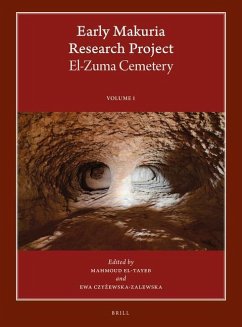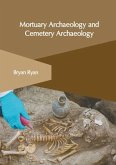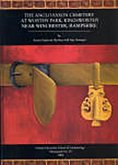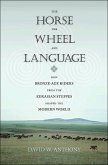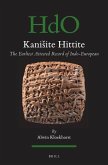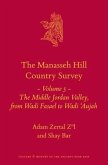Mahmoud El-Tayeb, Aneta Cedro, Czy &, Urszula Iwaszczuk, Jolanta Juchniewicz, Zofia Kowarska, Iwona Kozieradzka-Ogunmakin, Szymon Lenarczyk, Robert Mahler, Skowro &
Early Makuria Research Project. El-Zuma Cemetery (3-Vol. Set)
Mahmoud El-Tayeb, Aneta Cedro, Czy &, Urszula Iwaszczuk, Jolanta Juchniewicz, Zofia Kowarska, Iwona Kozieradzka-Ogunmakin, Szymon Lenarczyk, Robert Mahler, Skowro &
Early Makuria Research Project. El-Zuma Cemetery (3-Vol. Set)
- Gebundenes Buch
- Merkliste
- Auf die Merkliste
- Bewerten Bewerten
- Teilen
- Produkt teilen
- Produkterinnerung
- Produkterinnerung
Publication of the results of archaeological excavations at a UNESCO heritage site in Sudan. The Early Makurian elite tumuli cemetery from the 5th-6th centuries AD highlights an elite community in ancient Nubia at the dawn of a new age in its history, preceding the rise of the Christian kingdoms.
Andere Kunden interessierten sich auch für
![Mortuary Archaeology and Cemetery Archaeology Mortuary Archaeology and Cemetery Archaeology]() Mortuary Archaeology and Cemetery Archaeology179,99 €
Mortuary Archaeology and Cemetery Archaeology179,99 €![The Anglo-Saxon Cemetery at Worthy Park, Kingsworthy, Near Winchester, Hampshire The Anglo-Saxon Cemetery at Worthy Park, Kingsworthy, Near Winchester, Hampshire]() Sonia Chadwick HawkesThe Anglo-Saxon Cemetery at Worthy Park, Kingsworthy, Near Winchester, Hampshire45,99 €
Sonia Chadwick HawkesThe Anglo-Saxon Cemetery at Worthy Park, Kingsworthy, Near Winchester, Hampshire45,99 €![Horse, the Wheel, and Language Horse, the Wheel, and Language]() David W. AnthonyHorse, the Wheel, and Language27,99 €
David W. AnthonyHorse, the Wheel, and Language27,99 €![Report On Researches in an Anglo-Saxon Cemetery at Long Wittenham, Berkshire, in 1859 Report On Researches in an Anglo-Saxon Cemetery at Long Wittenham, Berkshire, in 1859]() AnonymousReport On Researches in an Anglo-Saxon Cemetery at Long Wittenham, Berkshire, in 185934,99 €
AnonymousReport On Researches in an Anglo-Saxon Cemetery at Long Wittenham, Berkshire, in 185934,99 €![Archaeology of Early Colonial Interaction at El Chorro de Maíta, Cuba Archaeology of Early Colonial Interaction at El Chorro de Maíta, Cuba]() Roberto Valcárcel RojasArchaeology of Early Colonial Interaction at El Chorro de Maíta, Cuba98,99 €
Roberto Valcárcel RojasArchaeology of Early Colonial Interaction at El Chorro de Maíta, Cuba98,99 €![Kanisite Hittite Kanisite Hittite]() Alwin KloekhorstKanisite Hittite218,99 €
Alwin KloekhorstKanisite Hittite218,99 €![The Manasseh Hill Country Survey Volume 5 The Manasseh Hill Country Survey Volume 5]() Adam Zertal ZlThe Manasseh Hill Country Survey Volume 5165,99 €
Adam Zertal ZlThe Manasseh Hill Country Survey Volume 5165,99 €-
-
-
Publication of the results of archaeological excavations at a UNESCO heritage site in Sudan. The Early Makurian elite tumuli cemetery from the 5th-6th centuries AD highlights an elite community in ancient Nubia at the dawn of a new age in its history, preceding the rise of the Christian kingdoms.
Hinweis: Dieser Artikel kann nur an eine deutsche Lieferadresse ausgeliefert werden.
Hinweis: Dieser Artikel kann nur an eine deutsche Lieferadresse ausgeliefert werden.
Produktdetails
- Produktdetails
- Verlag: Brill
- Seitenzahl: 936
- Erscheinungstermin: 23. Juni 2021
- Englisch
- Gewicht: 4171g
- ISBN-13: 9789004433748
- ISBN-10: 9004433740
- Artikelnr.: 60916035
- Herstellerkennzeichnung
- Libri GmbH
- Europaallee 1
- 36244 Bad Hersfeld
- gpsr@libri.de
- Verlag: Brill
- Seitenzahl: 936
- Erscheinungstermin: 23. Juni 2021
- Englisch
- Gewicht: 4171g
- ISBN-13: 9789004433748
- ISBN-10: 9004433740
- Artikelnr.: 60916035
- Herstellerkennzeichnung
- Libri GmbH
- Europaallee 1
- 36244 Bad Hersfeld
- gpsr@libri.de
VOLUME I: Mahmoud El-Tayeb, Ph.D. (2013), University of Warsaw, is Assistant Professor at that university's Polish Centre of Mediterranean Archaeology and head of the Centre's Polish Archaeological Unit in Khartoum. Initiator and director of the Early Makuria Research Project, his research is focused on burial customs and burial architecture of the post-Meroitic period in Sudan. Ewa Czyżewska-Zalewska, M.A. (2004), University of Warsaw, is a researcher at that university's Polish Centre of Mediterranean Archaeology. Working on excavations in Sudan and Egypt, she has focused on pottery from post-Meroitic Nubia and Late Roman Egypt, as well as ethnoarchaeological studies of modern pottery workshops. Urszula Iwaszczuk, Ph.D. (2015), University of Warsaw, is a field archaeozoologist co-operating with archaeological missions in Northern Africa, Kuwait, Russia and Poland. She teaches archaeozoology at the University of Warsaw. Her publications include several articles and book chapters. Jolanta Juchniewicz, M.Sc. (2012), Warsaw University of Technology and Kraków University of Technology, is a civil engineer and specialist in architectural urban conservation. She has participated in archaeological projects in Lebanon, Kuwait, United Arab Emirates and Sudan as an engineer, surveyor and documentalist. Zofia Kowarska, M.A., (2008), University of Warsaw, freelance archaeologist and documentalist, associated with PCMA UW projects in the Near East and North Africa. She is author and co-author of publications on late antique pottery, ethnoarchaeology and methods of documentation. Iwona Kozieradzka-Ogunmakin, Ph.D. (2014), University of Manchester, is a bioarchaeologist and former Marie Curie Research Fellow at the University of Warsaw. Her research and publications are focused on exploring the human-environment relationships in the Nile Valley through patterns of health and disease, subsistence and migration. Szymon Lenarczyk, Ph.D. (2017), University of Warsaw, is a freelance archaeologist and documentalist, working mainly on Near Eastern and North African projects. His interests include craftsmanship in late Roman Africa and urban development studies. Robert Mahler, Ph.D. (2018), University of Warsaw, is a researcher and adjunct at that university's Polish Centre of Mediterranean Archaeology. His research focuses on the archaeology of death in Egypt and Sudan. He is author of a monograph on the Islamic cemetery on Kom el-Dikka. Ewa Skowrońska, M.A. (2013), University of Wroclaw, is a freelance field archaeologist participating in excavation projects of the Institute of Mediterranean and Oriental Cultures of the Polish Academy of Sciences and the Polish Centre of Mediterranean Archaeology, University of Warsaw, in Sudan. VOLUME II: Ewa Czyżewska-Zalewska, M.A. (2004), University of Warsaw, is a researcher at that university's Polish Centre of Mediterranean Archaeology. Working on excavations in Sudan and Egypt, she has focused on pottery from post-Meroitic Nubia and Late Roman Egypt, as well as ethnoarchaeological studies of modern pottery workshops. Aneta Cedro, M.A. (2006), Nicolaus Copernicus University in Toruń, is a researcher at the Institute of Mediterranean and Oriental Cultures, Polish Academy of Sciences. Her main research interest is Nubian pottery and its technology, from Meroitic to modern times. She has also participated in projects in Egypt and Spain, where she focused on the ceramics from the Late Roman period and especially on oil lamps. VOLUME III: Joanna Then-Obluska, Ph.D. (2008), Jagiellonian University, is a researcher at the University of Warsaw, writing on ancient and medieval beads. Her most recent monograph on the glass bead trade in northeastern Africa based on evidence from Meroitic and post-Meroitic Nubia earned her a habilitation from the University of Warsaw in 2020. Lukasz Zieliński, M.A. (2011), University of Warsaw, is a doctoral candidate at the University of Warsaw. He has participated in excavations in Sudan and the United Arab Emirates. His research and articles have focused on ancient Nubian weaponry of the post-Meroitic period. Ewa Czyżewska-Zalewska, M.A. (2004), University of Warsaw, is a researcher at that university's Polish Centre of Mediterranean Archaeology. Working on excavations in Sudan and Egypt, she has focused on pottery from post-Meroitic Nubia and Late Roman Egypt, as well as ethnoarchaeological studies of modern pottery workshops.

